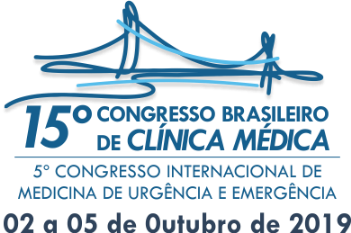Dados do Trabalho
Título
IMBALANCE OF BACTEROIDESAND BIFIDOBACTERIUM SPECIES IN THE GUT MICROBIOTA FROM HASHIMOTO’S THYROIDITIS PATIENTS
Fundamentação/Introdução
Introdução/Fundamentos: Intestinal dysbiosis have been associated with autoimune diseases development, including Hashimoto's thyroiditis (HT).
Objetivos
Objetivos: The aim of this study was to evaluate presence of specific bacteria in stool samples from HT patients, and correlate this data with diet, clinical data, and inflammatory cytokines.
Delineamento e Métodos
Delineamento/Métodos: This study was approved by the Research Ethics Committee from Barretos Cancer Hospital (Process nº 1.359 / 2017) and HT patients and control subjects assigned the informed consent and answered the questionnaire about lifestyle and dietary habits. Stool samples were requested for the characterization of the intestinal microbiota by real-time PCR, and the serum was used for cytokine quantification by flow cytometry. Data were analyzed by Pearson's Chi-square test, Mann-Whitney U test, and Spearman's correlation. Forty patients with HT, aged 23 and 82 years (48,9 13,3) and 53 controls, aged 18 and 79 years (45,6 ± 16,7), were included.
Resultados
Resultados: We observed significant differences (P<0,05), between patients and controls, regarding consumption of vegetables, fresh fruits, dairy products, carbohydrates, animal-derived proteins, saturated fats, canned foods, hot drinks and probiotics. The relative expression units (REU) of Bacteroides spp. were significantly increased (P<0,0001) in HT patients, and the REU of Bifidobacterium spp. were decreased (P=0,005) in patients, when compared with controls. We found an inverse correlation between animal-derived protein consumption and the REU of Bacteroides spp., which includes saccharolytic bacteria. We found no significant differences in serum concentrations of IL-2, IL-4, IL-6, IL-10, IL-17A, TNF and IFN-γ between patients and controls, however, correlations between IFN-γ concentrations and Prevotella spp. and Clostridium leptum abundances, and between TNF concentrations and Roseburia spp. and Clostridium leptum abundances.
Conclusões/Considerações finais
Conclusões/Considerações finais: We concluded that there are differences in the composition of the intestinal microbiota between HT patients and controls. In addition, dietary habits play an important role in determining the composition of the microbial community in the human intestine.
Palavras-chave
Área
Clínica Médica
Instituições
Ambulatório Médico de Especialidades - AME - São Paulo - Brasil, Faculdade de Ciências da Saúde de Barretos - Dr. Paulo Prata - São Paulo - Brasil, Hospital de Câncer de Barretos - Hospital de Amor - São Paulo - Brasil, Universidade Estadual Paulista - UNESP - São Paulo - Brasil
Autores
Larissa Vedovato Vilela Salis, Leonardo César Freitas Cayres, André Van Helvoort Lengert, João Luiz Brisotti, Larissa Donadel Barreto Sargentini, Gislane Lelis Vilela de Oliveira
